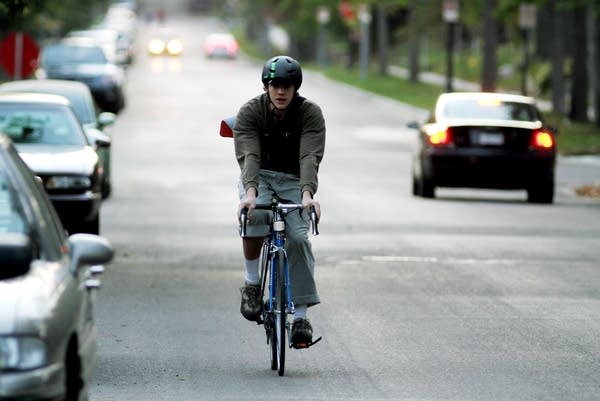Some Jefferson Avenue Bikeway neighbors try to brake project

The Twin Cities usually gets high marks as a great place to ride a bike. Federal dollars are paying for more programs to encourage alternatives to driving. But one proposal to expand cycling in St Paul has some residents considering legal action.
The proposed four-mile long Jefferson Avenue Bikeway would run through residential St. Paul from Mississippi River Boulevard on the west to Seventh Street near downtown. It is one small segment of more than 75 miles of new bikeways and sidewalk changes planned under a federally-funded pilot program called Bike Walk Twin Cities.
St. Thomas University professor Cara Anthony, 42, and her husband don't own a car -- they rely on bicycles to get around. An experienced cyclist, she feels comfortable using Jefferson now, even without street markings and other signs intended to alert drivers to cyclists. And she says she's looking forward to using the proposed bikeway once it's complete.
"It would definitely make it easier for me to get all the way east and all the way west for those kinds of errands that take me in those directions," she said.
Create a More Connected Minnesota
MPR News is your trusted resource for the news you need. With your support, MPR News brings accessible, courageous journalism and authentic conversation to everyone - free of paywalls and barriers. Your gift makes a difference.
But even though the bikeway is still in the planning phase, even the suggestion of roadway changes has ignited vocal opposition among some residents near the western section of the project.
Jefferson Avenue Bikeway's proposed route. (Story continues below map.):
Among those opponents is Clare Malloy Bluhm, 36, who formed a Facebook group and held meetings with neighbors when the city tested a median at the intersection of Jefferson and Cleveland avenues related to the bikeway project. The median blocked drivers from turning left.
Bluhm says that, as a result, cars went speeding down side streets and alleys where neighborhood children play. She worried for her son, who has Down syndrome and other health issues.

"One after another, cars would come up here at top speed and then turn off up at Kenneth," she said. "It was scary."
City officials confirm that several hundred more cars did divert to adjacent streets immediately after the median went up, but they say similar projects have shown drivers quickly adjust and find more efficient routes to take. The city removed the test median before that happened.
Even without the median, Colleen Kelly, 43, still opposes the bikeway. She says she is not against bikes -- she joined Bluhm in organizing against the project because of concerns about cost, and losing parking and other access to the street.
Now, their group is considering hiring an attorney to fight the project.
"When we start talking about narrowing our roadways, putting up roadblocks, eliminating stop signs or lights, things that would make it unsafe for pedestrians or other cars just to accommodate this very small minority of bikers on essentially a roadway system that already exists from one end to the other, and to then put a million dollars into it and call it a bikeway, is insulting," she said.

Officials from Transit for Livable Communities, the nonprofit overseeing Bike Walk Twin Cities, say the goal of the bikeway is actually to encourage less experienced riders to bike by making it safer for them, too. To slow auto traffic, they remodel bikeway streets to include things like traffic circles and speedbumps. Studies have shown that similar treatments can dramatically increase bicycle use and reduce crashes.
Emily Erickson, St. Paul's sustainable transportation planner, also says fears about the bikeway are unfounded. The city has yet to finalize its plans, but nothing in the bikeway proposal calls for eliminating parking, access to alleyways or prohibiting cars from using Jefferson Avenue.
Studies also show that collisions between cars and bikes go down as more cyclists share the road.
And in Minneapolis, census figures show the number of people commuting to work by bike has increased from an estimated 3000 to 7,200 between 1990 and 2007. At the same time, there has been a 20 percent drop in bicycle crashes since 2000.
"There is really nothing to be angry or upset about at this point because we are trying to understand what we would do," she said, adding that while opponents to the bikeway have been especially vocal, she's also received dozens of phone calls and e-mails from residents expressing their support for the project.
"The bottom line is that the vision for this project is in accord with our adopted city plans and policies that have arisen out of a desire to create a more livable city in St. Paul," she said. "But at the same time, whatever will happen on Jefferson will be determined through the public process that remains."
The next public meeting on the project will be held from 6-8:30 p.m. Tuesday (Oct. 25) at Nativity School -- just a block or so from the proposed bikeway.
After that, Public Works will make recommendations to the city council in March.

